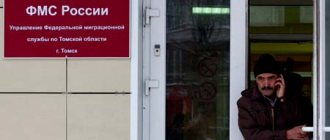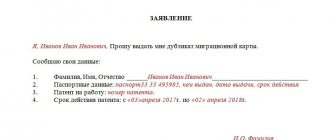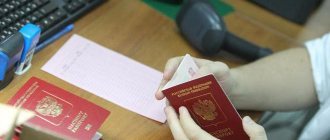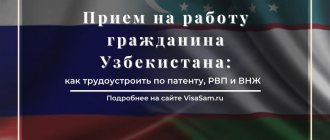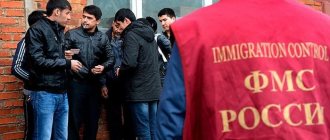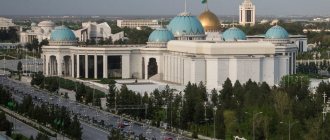The legal status of foreign citizens is determined by the laws set out in the Constitution of the Russian Federation. If federal laws or international agreements do not provide for any other provisions, then they have the same rights and bear the same responsibilities as Russians.
Constitution of the Russian Federation
The “Declaration of Human Rights”, proclaimed by the UN in 1985, ensures fundamental human rights (as provided for in International Human Rights Treaties), including those guaranteed to non-citizens. Covenants are legally binding instruments that require each state that ratifies them to protect certain human rights for all persons within its territory and subject to its jurisdiction.
Federal Law 115 on the legal status of foreign citizens in the Russian Federation can be downloaded here.
Legal status of foreigners on the territory of the Russian Federation
The Declaration provides guidance to States as they develop and implement laws designed to protect the dignity and freedom of each individual person. There are certain inalienable rights for all people, regardless of citizenship or nationality, as set out in the 1948 Universal Declaration of Human Rights. Organizations such as the UN Committee on the Elimination of Racial Discrimination play a key role in helping and protecting non-citizens around the world.
What does legal status entail?
The fundamental state law of the Russian Federation strictly defines the rights and obligations of foreign citizens.
Legal status provides:
- Equal status before the law regardless of any social, national, religious, professional, economic and similar factors.
- The Russian Federation has the right to establish certain restrictions or additional requirements for citizens from countries with similar restrictions and requirements.
- The rights and interests of Russians should not be infringed for the sake of the interests and rights of foreigners, which is clarified by the relevant law.
- Compliance with the laws of the Russian Federation is a necessary condition. According to the documents issued, for certain personal or business reasons, those coming to Russia can move freely around the country, but excluding territories that require special permission to visit.
A number of exceptions limit the actions of migrants. They can not:
- apply for state (municipal) positions;
- have the right to vote;
- be called up for state military service (there is the possibility of contract service);
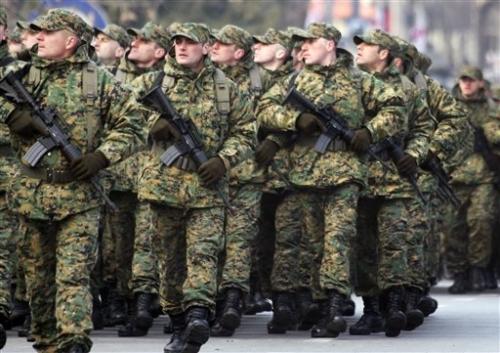
- be a member of the crew of a ship flying a national flag or another vessel operated in the non-commercial sector;
- serve in enterprises or institutions providing security related to classified information, radioactive and nuclear products.
Categories of foreigners
A foreign citizen is a person who is not a national of the host country (Russia) in which he temporarily resides. His identity is verified by a national passport or other document recognized by the Russian Federation. However, the exact definition depends on the context. Foreigners are differentiated into categories depending on the purpose of their stay.
Types of foreign citizens are those who:
- stays temporarily;
- resides temporarily;
- resides permanently.
These statuses provide different opportunities, in particular, different periods of stay on the territory of the Russian Federation.
Persons in the first category cannot apply for a residence permit or citizenship.
More information about the legal status of foreigners in Russia can be found in the video below.
Migration legislation is related to all rights: civil, labor, tax, administrative, international. This means that a foreign citizen has equal rights with Russians, but migration rules limit the temporary residence permit only to the region where the person is registered. Migrants are required to comply with the conditions of their status.
Labor activity
The 2021 Law on the Legal Status of Foreign Citizens in the Russian Federation states that these persons have the right to dispose of their abilities and property to carry out entrepreneurial activities, as well as to choose a profession. But a foreigner is required to obtain a patent to work in Russia. An employer can be an individual or legal entity that has permission to employ a citizen of another state. Also, a foreigner who has registered an individual entrepreneur has the right to become one.
A person who has a temporary residence permit cannot carry out labor activities outside the territory of residence specified in the document. He also does not have the right to apply for a position that is not indicated in the work permit. An employer can employ a foreigner without mandatory clearances in the following cases:
- The citizen arrived in order when a visa is not required.
- Is involved in work as a highly qualified specialist or is a member of his family.
- Undergoes full-time training and receives secondary vocational or higher education.
- Sent to company branches located in the Russian Federation.
The employer is obliged to inform the migration authorities that he has hired a foreign employee. An employment or civil law contract can be concluded with a citizen. Also, a foreigner must take out a voluntary health insurance policy or an agreement for the provision of paid medical services. Foreign students also have the right to get a job. Having concluded an employment or civil contract, they receive a work permit.
Special categories
People come to the Russian Federation for a specific purpose. For the sake of reuniting with family or, for example, for work or study. The reason for stay is the purpose of arrival, for which the migrant receives temporary residence status (with a visa or visa-free), permission is recorded in the form of a mark in the passport, or permanent residence (has nothing to do with citizenship, but provides for some conditions that are due to citizens, including social benefits and pensions).
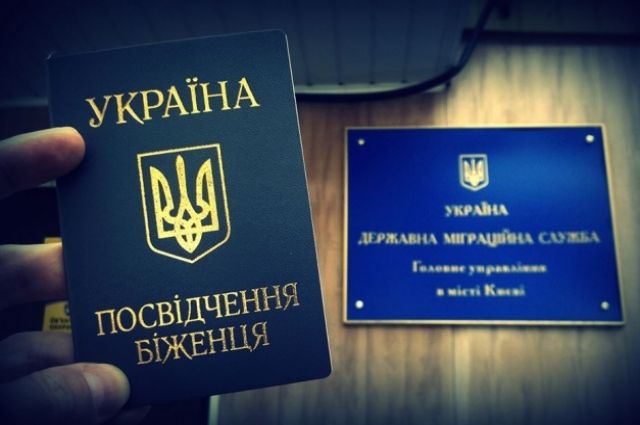
Refugee status
Special statuses that foreign citizens may have:
- Diplomatic is a form of legal immunity that guarantees authorized persons inviolability of property, tax exemption, immunity from lawsuits or prosecution in accordance with the laws of the host country. Modern diplomatic immunity was codified as international law in the Vienna Convention on Diplomatic Relations in 1961.
- Highly qualified specialists who are not subject to the quota system and obtaining a work visa for them is a simple and quick process. It is valid for three years and can be extended for a further three years within 30 days before the current visa expires.
- Refugee status is a person who is forced to cross national borders and has no way of returning home safely. To receive it, the bearer must submit an application for asylum. While awaiting a decision, he is in the status of an asylum seeker. Once a displaced person is granted refugee status, they enjoy certain rights agreed to in the 1951 Refugee Convention (not all countries have signed and ratified this convention).
Legal regimes
The visa policy of the Russian Federation has a number of requirements. The provision of visas is based on bilateral or multilateral agreements. Today, the Russian Federation has agreements with many countries whose citizens are exempt from a visa or can apply for one online. In other cases, you must obtain a visa in advance from a diplomatic mission or visa center.
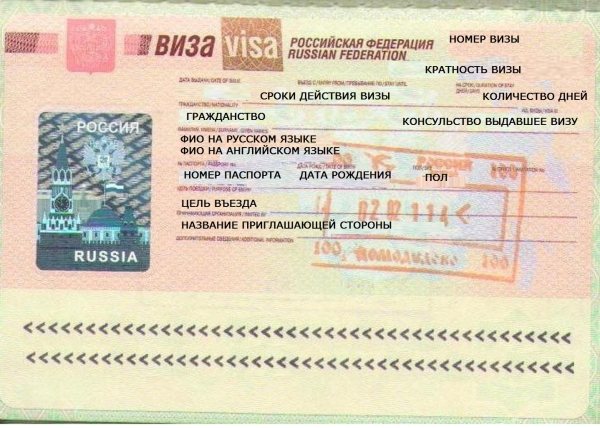
Visa to Russia
In total, citizens of 48 countries are not required to obtain a visa if their stay lasts no more than the visa waiver limit. However, “visa-free” foreigners are required to have a migration card. With the exception of representatives of Belarus, which has a special relationship with Russia, those eligible for visa-free travel cannot stay longer than 90 days (during any 180-day period).
- Temporary stay status refers to the presence of a foreigner in the country (with or without a visa) for 90 days, without issuing a temporary residence permit. Upon expiration of the status, the person will have to leave the country, unless such situations as visa extension (or visa-free residence), waiting to receive a temporary residence permit, employment as a highly qualified worker, or study are not considered.
- A temporary residence permit in the form of a mark in the national passport (or in the form of an independent document) refers to the status of a resident in the Russian Federation, of which he is not a citizen. It is issued in accordance with quotas determined by the government for a period of 3 years. Exclusive rights, outside the quota system, are enjoyed by citizens of other countries in cases provided for by law, such as, for example, highly qualified specialists.
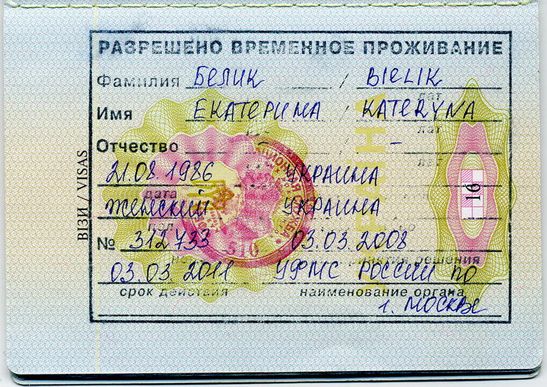
Example of a temporary residence permit of the Russian Federation
- A residence permit is a document (migration card) that allows a person who does not have Russian citizenship to reside in the country for a fixed period. This permit is valid for 5 years, but can subsequently be extended for a similar period many times.
The threshold required is an extension of stay, which may be an intermediate step towards applying for permanent residence. Residence status is granted for a number of reasons, and the criteria for acceptance as a resident may change over time. It happens that government authorities refuse to apply for a residence permit (or temporary residence) on legal grounds.
This happens if:
- has an outstanding felony conviction;
- false information or false documents are provided;
- the person suffers from an (infectious) disease that poses a danger to other people.
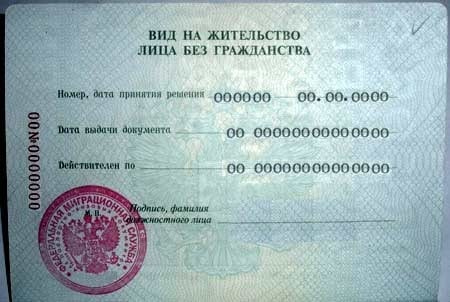
Sample of a residence permit in Russia
Obtaining a residence permit
To obtain a residence permit, a foreigner must be granted temporary resident status, which is issued within the quota established by the Russian government, taking into account demographic and other factors, and distributed among federal regions. Some individuals may be given such permits outside the quotas: those who have invested in the economic development of the country or entered into a marriage with a Russian citizen.
At the same time, it can be canceled in a number of cases when residency or other obligations imposed on the status are not observed. For example, if a foreign citizen was within the host country for more than a certain period of time; in case of repeated violation of the rules of migration registration; constituted a threat to national security, or if a serious crime is committed, then the person becomes subject to deportation. In some cases, this status may be due to a certain type of employment or business. Holders have the same obligations as citizens of the Russian Federation regarding taxes.
Registration of residents is mandatory in the Russian Federation.
There are separate registers for foreign citizens (or stateless persons). Temporary residence is registered at the request of the employer or hotel administrator, and so on. The request must also be submitted within 7 days.
Accommodations
Federal Law 115 defines foreign citizens as persons who are not citizens of the Russian Federation and have a passport of another state. Their presence in Russia is regulated by the Constitution, Federal Law and international treaties.
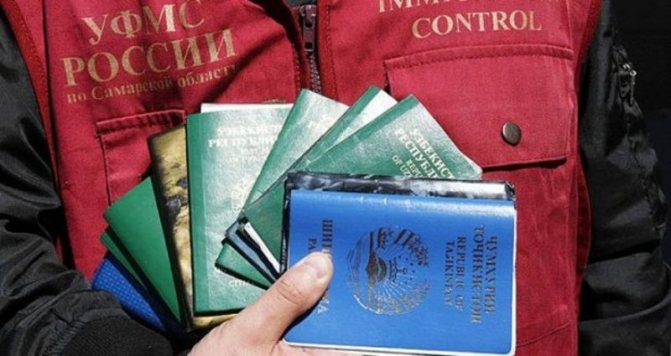
Foreigners may apply for a temporary stay, which is determined by the visa issued. There are a number of states with which a special agreement has been signed, allowing citizens not to draw up a document. In this case, the period of stay in the Russian Federation will be:
- Arrival on personal initiative - 90 days.
- The arrival of a highly qualified specialist in the country at the invitation of a Russian company is the period specified in the work permit. On these grounds, the entire employee’s family has the right to live.
The end of the period of temporary residence is the basis for the foreigner to leave the country. But he may be delayed if he takes the following actions:
- Extend your visa.
- Submit documents for obtaining a residence permit.
- Enroll in an educational institution as a full-time or part-time student.
- Conclude a contract with the Armed Forces of the Russian Federation.
- Apply for Russian citizenship.
Having a temporary residence permit, a foreigner can apply for permanent residence. The registration rules have not changed. According to the Law “On the Stay of Foreign Citizens on the Territory of the Russian Federation” in 2021 it is necessary:
- Live in the country for more than a year.
- Collect documents for obtaining a residence permit six months before the expiration of the temporary residence permit. The application can be submitted to territorial authorities during a personal visit or through the government services portal.
A permanent residence permit is issued for five years. After this period has expired, the citizen has the right to extend it for the same amount of time. The procedure must be carried out two months before the expiration date.
The Russian Federation does not recognize other citizenships. The exception is countries with which an agreement has been signed on the possibility of being citizens of two states. For this reason, a foreigner will have to formalize a renunciation of citizenship of another country. Only in this case can he receive a residence permit.
This rule applies to citizens of Ukraine who speak Russian and have moved to permanent residence in the Russian Federation. There is no special agreement between the countries, so renunciation of Ukrainian citizenship is mandatory. The notarized form is submitted to the Russian migration authority along with other documents.

